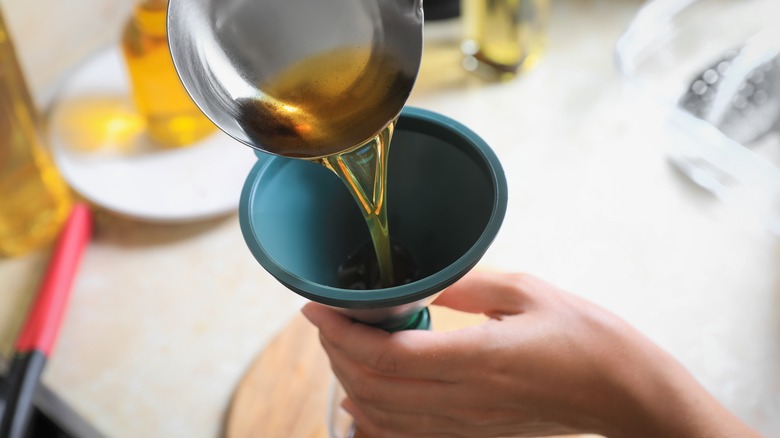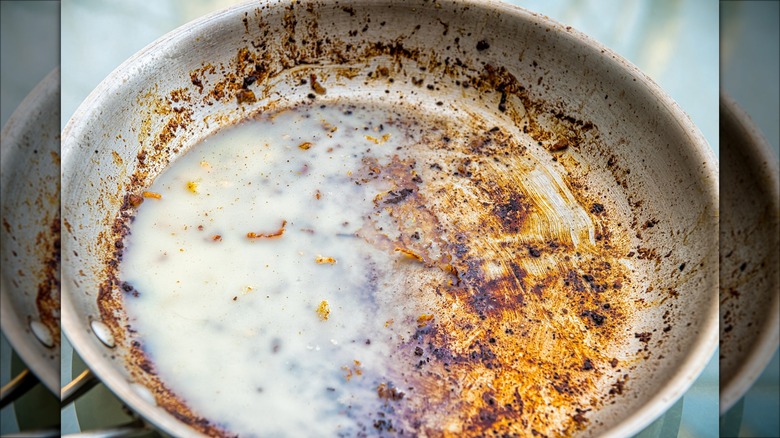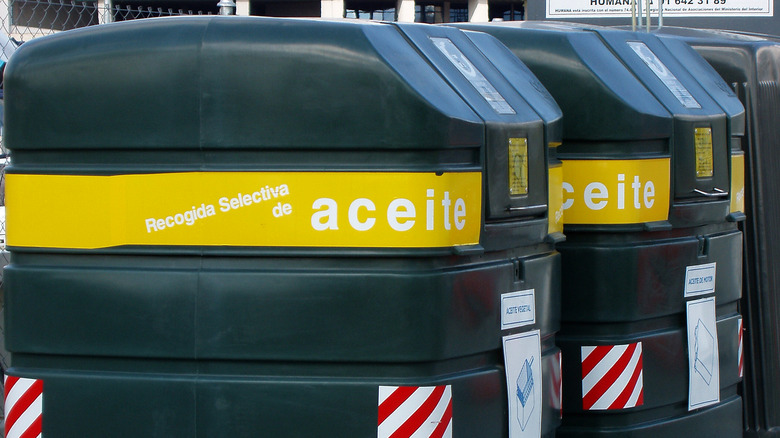The Restaurant Hack To Dispose Of Used Cooking Oils
If you've ever roasted a chicken only to have a pan full of rendered fat or used the deep fryer to make golden brown mozzarella sticks, you've likely encountered the question of what to do with all your leftover cooking oils and grease. Most home cooks know it's a major no-no to dump fats and oils down the kitchen sink since it clogs household drains and sewer systems and contaminates public waterways, but tossing the liquids into your trash is also a messy, unappealing affair. All around it can be a bit of a headache to get rid of all the leftover fats that accumulate as you cook meals week after week. Luckily, there's an easy way to dispose of your cooking oils: Take them to a local restaurant and use their grease collection containers.
Sure, you could place your frying oil in a sealed glass or Tupperware and reuse it, or seal grease from cooking tightly in an aluminum foil pouch and place it in the trash. However, there are limitations on how much oil you can throw away with these methods. Plus, using grease recycling services, like those used by restaurants, is the most ideal and sustainable solution since those cooking oils are repurposed and made into things like biofuels and animal feed.
How to recycle cooking oils
While there are fat, oil, and grease (FOG) recycling centers available, there are far fewer of these specialized recycling centers than there are restaurants. It's likely that a FOG recycling center is farther away than your local fast food restaurant or greasy diner. Knowing you can recycle cooking oils at nearby restaurants can save you the time and energy of a trip all the way to a separate recycling place. Instead, the next time you are craving a juicy burger or fried food, see about taking your leftover cooking oils with you (just make sure they are in properly sealed, non-flammable containers).
While the restaurant's grease disposal containers are usually located in the back of the restaurant near other waste bins, as is the case with most things, it's always a good idea to ask for permission before using your restaurant's grease disposal containers first. It will certainly look a little fishy for a person to be rooting around behind a restaurant with a container of unidentifiable liquid. Instead, take the time to ask the restaurant manager if it would be okay to drop off your grease and cooking oils from time to time, and confirm with them any rules and regulations on the proper etiquette for disposal. For instance, they may ask you to drain your cooking oils in a colander or sieve or you might have to store your grease in specific containers or eco-friendly metal disposal bags. Some restaurants also use grease and oil tanks that are built into their kitchen, so the disposal program may differ based on the establishment.
Of course, not every restaurant will let you dump your grease with them, but all restaurants have grease disposal containers; if one establishment denies your request, move on to the next.
Repurposing cooking oils is a sustainable solution
Part of being a conscious cook and consumer is knowing how your actions can impact the environment and others around you. It's of utmost importance not to throw cooking oils down the sink, so if you're throwing your oils away properly, you're already off to a good start. Still, you can take your efforts one step further by recycling your fats and cooking oils with your local restaurant's disposal and transportation services. Not only will disposing of your cooking oils keep them from tainting natural ecosystems and clogging drains, but repurposing them can be a sustainable way to create byproducts from your old kitchen grease.
Once cooking oils are recycled at restaurants and collected in disposal containers, they undergo a filtration and rendering process to transform them into biodiesel fuels for commercial vehicles as well as other products like cosmetics. Biodiesel fuels made from leftover and repurposed cooking oils have been shown to reduce emissions compared to petroleum-based diesel fuels. Recycling cooking oils is a win-win for all involved, and it's actually mandatory for restaurants since it's an eco-conscious step and they often receive incentives and payments for recycling large quantities of cooking oils. Ultimately, what might be a huge amount of oil for a home cook, is just a drop in the bucket for most restaurants. As such, it's likely if you ask, a restaurant will allow you to recycle your oil in their waste containers. So take the extra step and bring them your leftover cooking grease.


